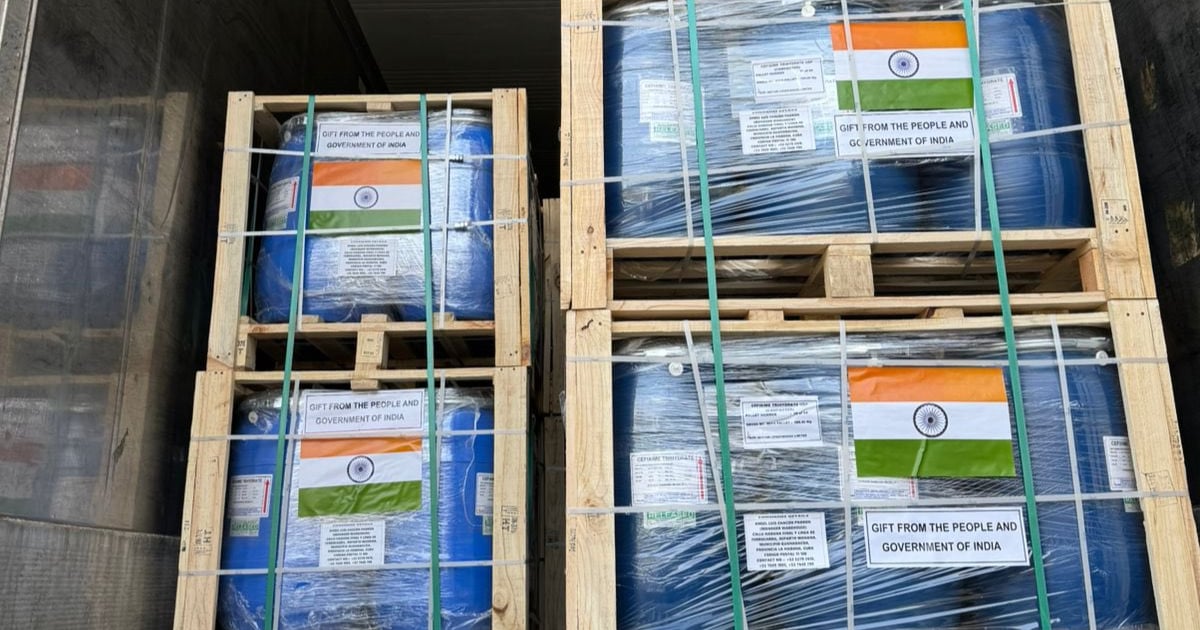With the shipment this Sunday of approximately 90 tons of active pharmaceutical ingredients, the government of India is supporting the production of medications in Cuba, offering a glimmer of hope to the island's healthcare sector.
Devoid of supplies and all types of resources from primary care to the hospital system, the health sphere is one of the most depressed areas due to the economic and political decisions of the regime, which gave free rein to the importation of medications by its nationals, thus stimulating an informal drug market.
The humanitarian assistance from India, which includes nine types of ingredients manufactured in that country, departed on June 2 from the port of Mundra in the western state of Gujarat. This shipment adds to the credits aimed at agricultural and renewable energy projects, as well as the millions of dollars in exports made during the 2023-2024 period destined for Cuba, according to data from the Indian Ministry of Commerce.
According to information released by the Ministry of External Affairs of the Asian nation, these resources "will be used by Cuban drug manufacturers to produce essential antibiotics in the form of tablets, capsules, syrups, and injections."
These medications are "necessary for the treatment of chronic communicable diseases" and could alleviate the crisis in the Cuban healthcare system, which has been facing a shortage of essential resources and medications for years.
"The assistance reaffirms India's status as the Pharmacy of the World and underscores our commitment to the historic friendship with Cuba," states the document signed in New Delhi.
Last year, more than 200 Cuban-made medications disappeared from the essential drug list due to production issues, and their presence in pharmacies and health centers still fluctuates due to the lack of raw materials. Despite this, BioCubaFarma continued to export its products to 73 countries, while regime leaders cite the U.S. embargo and the global economic situation as justifications.
The health system, one of the so-called "achievements of the Revolution," is currently also suffering from power outages in its hospitals. Additionally, the infrastructure of medical centers is deteriorating, and thousands of doctors have fled the country or abandoned international missions, choosing to leave behind the prevailing misery in what was once known as the "Pearl of the Caribbean."
China and India serve as the pharmaceutical pantry of the world due to their low costs and high production capacity. Approximately 80% of the active ingredients in drugs used in Europe and the United States are produced in these countries.
India's Pharmaceutical Aid to Cuba
In light of India's recent shipment of pharmaceutical ingredients to Cuba, here are some frequently asked questions to better understand the implications and details of this aid.
Why did India send pharmaceutical ingredients to Cuba?
India sent the ingredients to support Cuba's medication production amidst severe shortages caused by economic and political decisions of the regime.
What types of medications will be produced with these ingredients?
The ingredients will be used to produce essential antibiotics in various forms, including tablets, capsules, syrups, and injections, crucial for treating chronic communicable diseases.
How does this shipment fit into the broader context of India's relations with Cuba?
This shipment is part of a broader context of humanitarian aid and economic cooperation, including credits for agricultural and renewable energy projects, reinforcing India's commitment to its historic friendship with Cuba.
